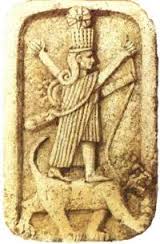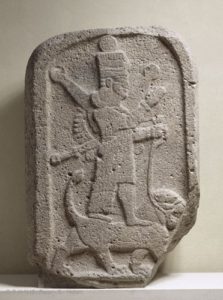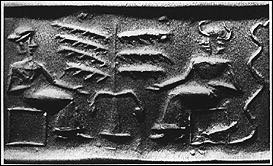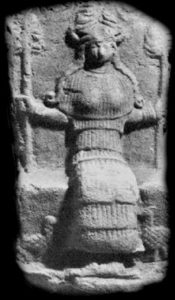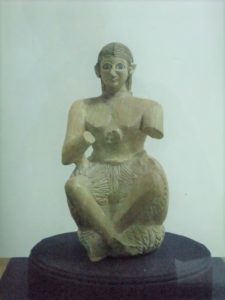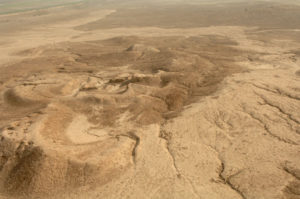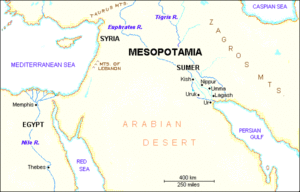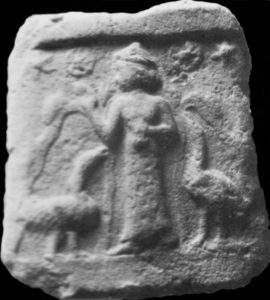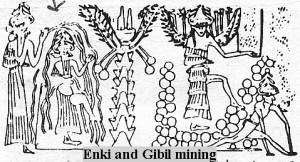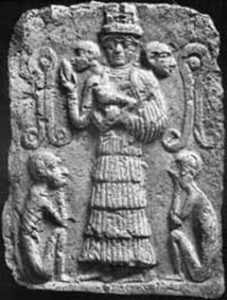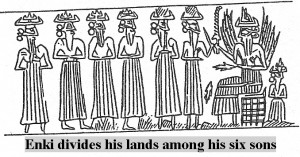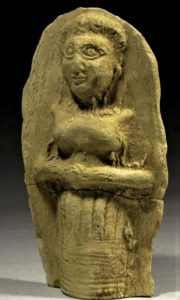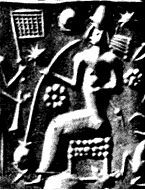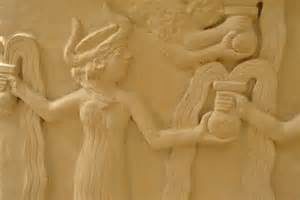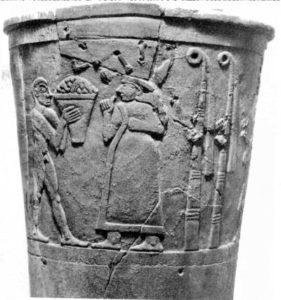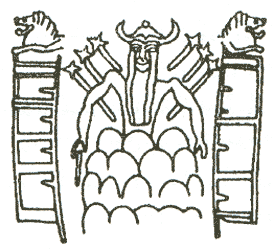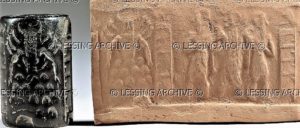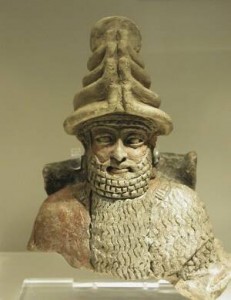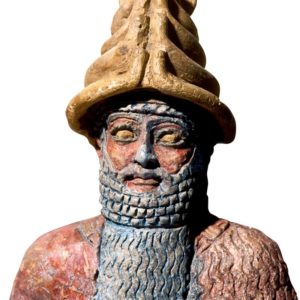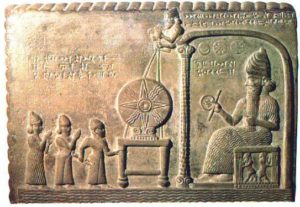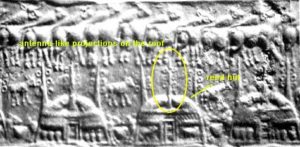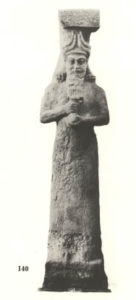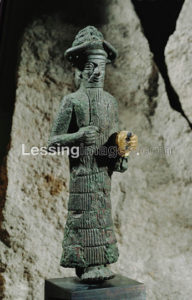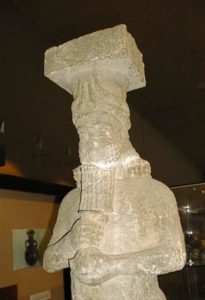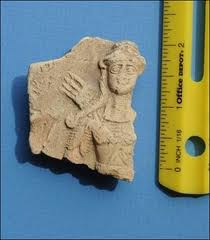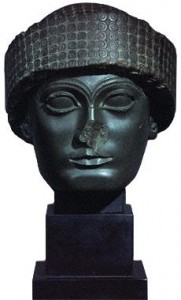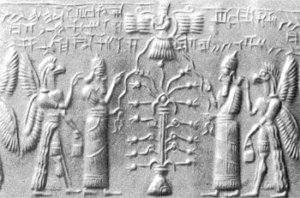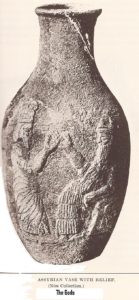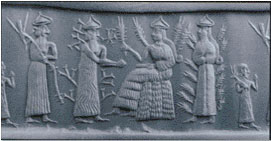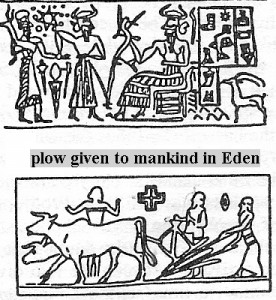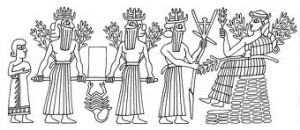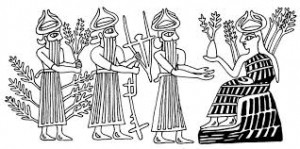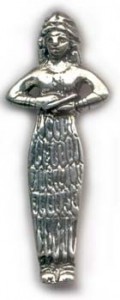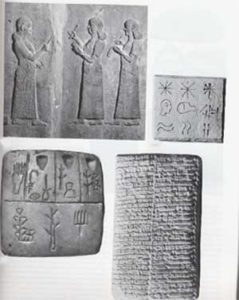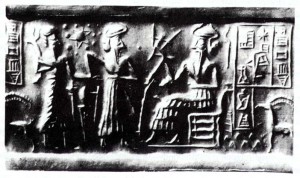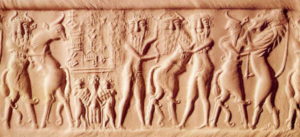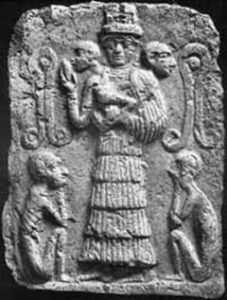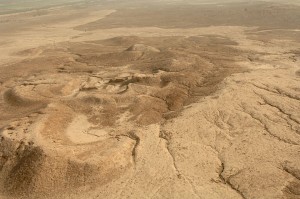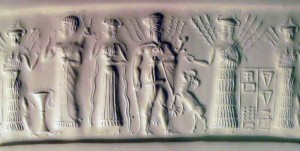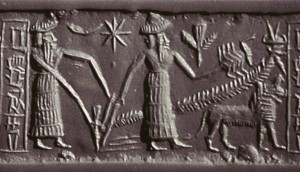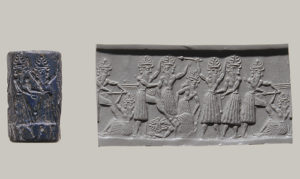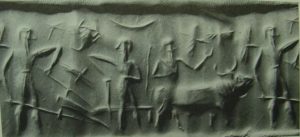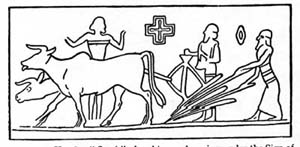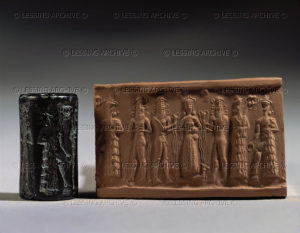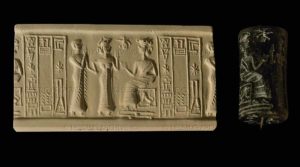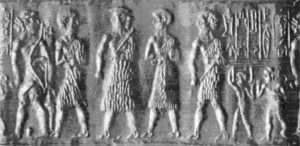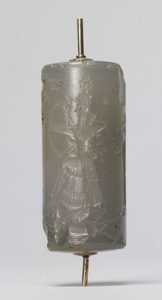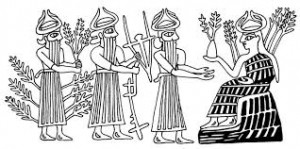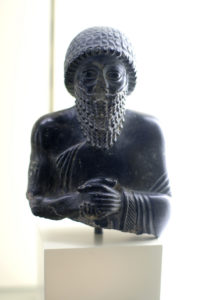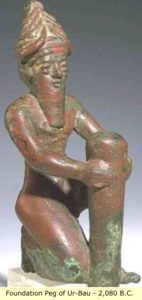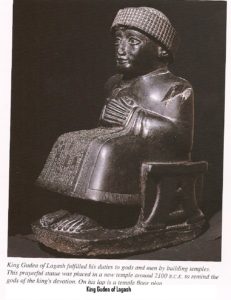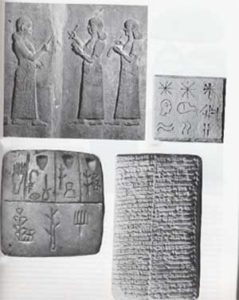(Texts: All Artifacts, Color Coding, & Writings in Bold Type With Italics Inside Parenthesis, are Added by Editor R. Brown, not the Authors, Translators, or Publishers!)
(gods in blue …mixed-breed demigods in teal…)
Ningal Quotes From Texts
Ningal = Nannar’s spouse, Enki’s & Nisaba’s daughter,
sister to Ninlil, mother to Inanna & Utu
Ningal Speaking in the 1st Person
“The woman, after she had composed her song (?) for the tearful balaj instrument,
herself utters softly a lamentation for the smitten (?) house:
“The storm that came to be — its lamentation hangs heavy on me.
Raging about because of the storm, I am the woman for whom the storm came to be.
The storm that came to be — its lamentation hangs heavy on me.
The bitter storm having come to be for me during the day,
I trembled on account of that day but I did not flee before the day’s violence.
Because of this wretched storm I could not see a good day for my rule, not one good day for my rule.
95-100A “The bitter lament having come to be for me during the night,
I trembled on account of that night but I did not flee before the night’s violence.
The awesomeness of this storm, destructive of cities, truly hangs heavy on me.
Because of its existence, in my nightly sleeping place, even in my nightly sleeping place truly there was no peace for me.
Nor, because of this wretched storm, was the quiet of my sleeping place,
not even the quiet of my sleeping place, allowed to me. (2 mss. add 1 line: Truly I did not forsake my Land.)
101-111 “Because there was bitterness in my Land, I trudged the earth like a cow for its calf.
My Land was not delivered from fear.
Because there was bitter distress in my city, I beat my wings like a bird of heaven and flew to my city;
and my city was destroyed in its foundations; and Urim perished where it lay.
Because the hand of the storm appeared above, I screamed and cried to it “Return, O storm, to the plain”.
The storm’s breast did not rise.
112-122 “To me, the woman, in the Agrun-kug, my house of queenship, they did not grant a reign of distant days.
Indeed they established weeping and lamentation for me.
As for the house which used to be where the spirit of the black-headed people was soothed,
instead of its festivals wrath and terror indeed multiply.
Because of this wretched storm, heavy spirit, and lament and bitterness,
lament and bitterness have been brought into my house, the favorable place,
my devastated righteous house upon which no eye had been cast.
My house founded by the righteous was pushed over on its side like a garden fence.
123-132 “For E-kic-nu-jal, my house of royalty, the good house, my house which has been given over to tears,
they granted to me as its lot and share: its building, falsely, and its perishing, truly.
Wind and rain have been made to fall on it, as onto a tent,
a shelter on the denuded harvest ground, as onto a shelter on the denuded harvest ground.
Urim, my all-surpassing chamber, the house and the smitten city, all have been uprooted.
Like a shepherd’s sheepfold it has been uprooted.
The swamp has swallowed my possessions accumulated in the city.”
133 3rd kirugu.
134 Urim has been given over to tears.
135 Its jicgijal.
136-143 “On that day, when such a storm had pounded, when in the presence of the queen her city had been destroyed,
on that day, when such a storm had been created, when they had pronounced the utter destruction of my city,
when they had pronounced the utter destruction of Urim, when they had directed that its people be killed,
on that day I did not abandon my city, I did not forsake my land.
144-150 “Truly I shed my tears before An (Anu).
Truly I myself made supplication to Enlil.
“Let not my city be destroyed,” I implored them.
“Let not Urim be destroyed,” I implored them.
“Let not its people perish,” I implored them.
But An did not change that word.
Enlil did not soothe my heart with an “It is good — so be it”.
“Its queen cried, “Alas, my city”, cried, “Alas, my house”.
Ningal cried, “Alas, my city,” cried, “Alas, my house.
As for me, the woman, both my city has been destroyed and my house has been destroyed.
O Nanna (Nannar), the shrine Urim has been destroyed and its people have been killed.”
250 6th kirugu.
251-252 In her cow-pen, in her sheepfold the woman utters bitter words: “The city has been destroyed by the storm.”
253 Its jicgijal.
254-264 Mother Ningal, like an enemy, stands outside her city.
The woman laments bitterly over her devastated house.
Over her devastated shrine Urim, the princess bitterly declares:
“An has indeed cursed my city, my city has been destroyed before me.
Enlil has indeed transformed my house, it has been smitten by pickaxes.
On my ones coming from the south he hurled fire.
Alas, my city has indeed been destroyed before me.
On my ones coming from the highlands Enlil hurled flames.
Outside the city, the outer city was destroyed before me — I shall cry “Alas, my city”.
Inside the city, the inner city was destroyed before me — I shall cry “Alas, my city”.
My houses of the outer city were destroyed — I shall cry “Alas, my houses”.
My houses of the inner city were destroyed — I shall cry “Alas, my houses”.
265-274 “My city no longer multiplies for me like good ewes, its good shepherd is gone.
Urim no longer multiplies for me like good ewes, its shepherd boy is gone.
My bull no longer crouches in its cow-pen, its herdsman is gone.
My sheep no longer crouch in their fold, their herdsman is gone.
In the river of my city dust has gathered, and the holes of foxes have been dug there.
In its midst no flowing water is carried, its tax-collector is gone.
In the fields of my city there is no grain, their farmer is gone.
My fields, like fields from which the hoe has been kept away (?), have grown tangled (?) weeds.
My orchards and gardens that produced abundant syrup and wine have grown mountain thornbushes.
My plain that used to be covered in its luxurious verdure has become cracked (?) like a kiln.
275-285 “My possessions, like a flock of rooks rising up, have risen in flight — I shall cry “O my possessions”.
He who came from the south has carried my possessions off to the south — I shall cry “O my possessions”.
He who came from the highlands has carried my possessions off to the highlands — I shall cry “O my possessions”.
My silver, gems and lapis lazuli have been scattered about — I shall cry “O my possessions”.
The swamp has swallowed my treasures — I shall cry “O my possessions”.
Men ignorant of silver have filled their hands with my silver.
Men ignorant of gems have fastened my gems around their necks.
My small birds and fowl have flown away — I shall say “Alas, my city”.
My slave-girls and children have been carried off by boat — I shall say “Alas, my city”.
Woe is me, my slave-girls bear strange emblems in a strange city.
My young men mourn in a desert they do not know.
286-291 “Woe is me, my city which no longer exists — I am not its queen.
Nanna, Urim which no longer exists — I am not its owner.
I am the good woman whose house has been made into ruins,
whose city has been destroyed, in place of whose city a strange city has been built.
I am Ningal whose city has been made into ruins, whose house has been destroyed,
in place of whose house a strange house has been built.
292-298 “Woe is me, the city has been destroyed, my house too has been destroyed.
Nanna, the shrine Urim has been destroyed, its people killed.
Woe is me, where can I sit, where can I stand?
Woe is me, in place of my city a strange house is being erected.
I am the good woman in place of whose house a strange city is being built.
Upon its removal from its place, from the plain,
I shall say “Alas, my people”. Upon my city’s removal from Urim, I shall say “Alas, my house”.”
299-309 The woman tears at her hair as if it were rushes.
She beats the holy ub drum at her chest, she cries “Alas, my city”.
Her eyes well with tears, she weeps bitterly: “Woe is me, my city which no longer exists — I am not its queen.
Nanna, the shrine Urim which no longer exists — I am not its owner.
Woe is me, I am one whose cow-pen has been torn down, I am one whose cows have been scattered.
I am Ningal on whose ewes the weapon has fallen, as in the case of an unworthy herdsman.
Woe is me, I have been exiled from the city, I can find no rest. I am Ningal,
I have been exiled from the house, I can find no dwelling place.
I am sitting as if a stranger with head high in a strange city.
Debt-slaves …… bitterness …….
310-320 “I am one who, sitting in a debtors prison among its inmates, can make no extravagant claims.
In that place I approached him for the sake of his city — I weep bitterly.
I approached the lord for the sake of his house — I weep bitterly.
I approached him for the sake of his destroyed house — I weep bitterly.
I approached him for the sake of his destroyed city — I weep bitterly.
Woe is me, I shall say “Fate of my city, bitter is the fate of my city”.
I the queen shall say “O my destroyed house, bitter is the fate of my house”.
O my brick-built Urim which has been flooded, which has been washed away,
O my good house, my city which has been reduced to ruin mounds,
in the debris of your destroyed righteous house, I shall lie down alongside you.
Like a fallen bull, I will never rise up from your wall (?).
321-327 “Woe is me, untrustworthy was your building, and bitter your destruction.
I am the woman at whose shrine Urim the food offerings have been terminated.
O my Agrun-kug, the all-new house whose charms never sated me,
O my city no longer regarded as having been built — devastated for what reason?
O my house both destroyed and devastated — devastated for what reason?
Nobody at all escaped the force of the storm ordered in hate.
O my house of Suen in Urim, bitter was its destruction.”
328 7th kirugu.
329 “Alas, my city, alas, my house.” …
388 “My powers have been alienated from me.”
“Immediately, Ningal jumped off the bed to tell her mom (& Ninlil’s mom),
the Barley Goddess Numbarshegunu, the news.
Father Haia, the Lord of Stores, was out in the fertile fields around Nippur,
and would be told of the auspicious events when back to the Kiur, the temple Enlil,
Nippur´s city god and lord Air (Enlil), had provided for Ninlil and family in his fast-growing-city.
They had come invited by Lord Enlil, who was building the city for his people…”
“Young Ningal lived out in the marshlands close to the ancient settlement of Eridu,
the beloved daughter of Ningikuga, the Goddess of Reeds, and Enki, the God of Magic, Crafts and Wisdom.
Slim, black-haired Ningal of eyes darker than a moonless night was quiet only in appearance,…
vibrant intensity and gift to unveil the language of the Unknown revealed in images,
age-old legends, poetry and most of all, in dreams.
She was naturally spontaneous yet reserved in many ways.
Dream interpretation was her gift, and this was no easy talent to have or share…”
“Ningal had learnt (many times the hard way) that to find the true meaning of a dream
it was necessary to keep a balance between the outer images she received, …”
“The E-kiš-nu-ĝal, the Agrun-kug, is your house of royalty!
Nanna and Ningal bring joyfulness to the dwelling. …”
“May they bring your greeting to Nanna and Ningal (Nannar’s spouse)…”
“Nanna and Ningal accept your offering…”
“the great gods Nanna and Ningal (Nannar’s spouse),…”
“’Friend of Enlil, let me go, so that I can go to our house!
What lie can I offer to my mother?
What lie can I offer to my mother Ningal?’
‘Let me teach you, let me teach you!
Inana, let me teach you the lies of women:’ …”
“that Nanna (Nannar / Sin) loves me (Ishme-Dagan) greatly,
that I am the son-in-law of Ningal (married to Inanna),
that Inana (Inanna / Ishtar) has made me attractive,…”
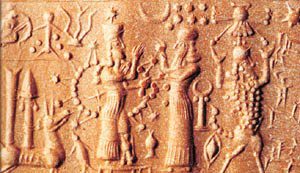 (Inanna with alien technologies, & grandfather Enlil, King Anu’s royal son & heir to throne of planet Nibiru, appointed by King Anu to be his Earth Colony Commander, with many symbols of alien gods above them)
(Inanna with alien technologies, & grandfather Enlil, King Anu’s royal son & heir to throne of planet Nibiru, appointed by King Anu to be his Earth Colony Commander, with many symbols of alien gods above them)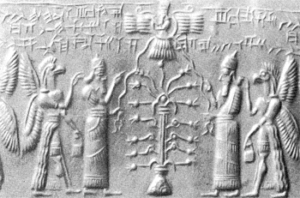 (eagle-headed & winged Apkulla / pilots, son Enki, Sky Father Anu in his sky-disc above the Tree of Life, & Earth Colony Commander son Enlil)
(eagle-headed & winged Apkulla / pilots, son Enki, Sky Father Anu in his sky-disc above the Tree of Life, & Earth Colony Commander son Enlil)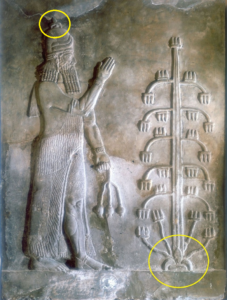 (Ninurta, son & heir to Enlil, both born of the “double seed”)
(Ninurta, son & heir to Enlil, both born of the “double seed”)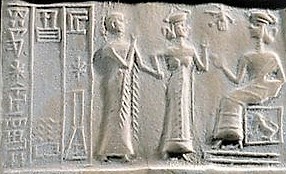 (king, spouse Inanna, & her mother Ningal; giant semi-divines chosen by Inanna to be her spouses, & then appointed to kingships, acting as the perfect go-betweens for alien gods & primitive “modern earthlings” in each of their cities, as earthlings became educated by them & workers for them)
(king, spouse Inanna, & her mother Ningal; giant semi-divines chosen by Inanna to be her spouses, & then appointed to kingships, acting as the perfect go-betweens for alien gods & primitive “modern earthlings” in each of their cities, as earthlings became educated by them & workers for them)